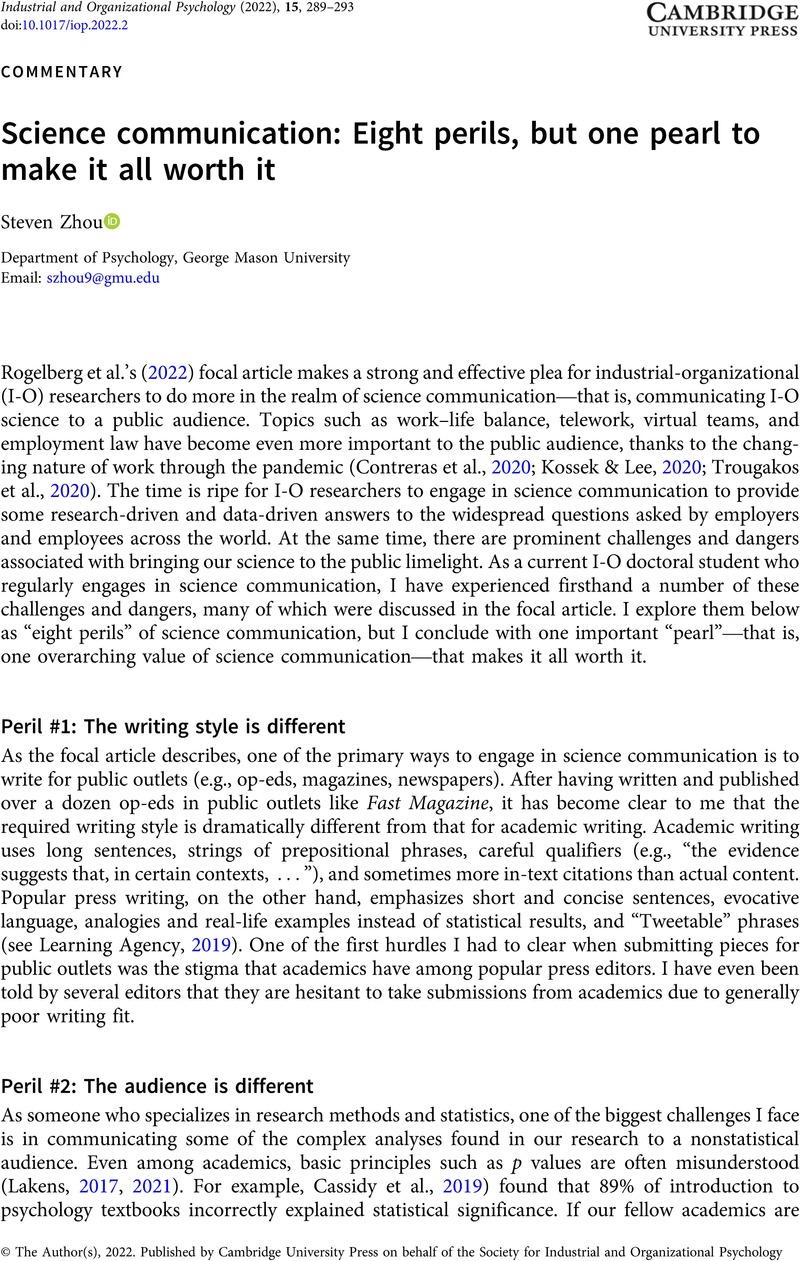No CrossRef data available.
Article contents
Science communication: Eight perils, but one pearl to make it all worth it
Published online by Cambridge University Press: 26 May 2022
Abstract
An abstract is not available for this content so a preview has been provided. Please use the Get access link above for information on how to access this content.

- Type
- Commentaries
- Information
- Copyright
- © The Author(s), 2022. Published by Cambridge University Press on behalf of the Society for Industrial and Organizational Psychology
References
Cassidy, S. A., Dimova, R., Giguère, B., Spence, J. R., & Stanley, D. J. (2019). Failing grade: 89% of introduction-to-psychology textbooks that define or explain statistical significance do so incorrectly. Advances in Methods and Practices in Psychological Science, 2(3), 233–239. https://doi.org/10.1177/2515245919858072
CrossRefGoogle Scholar
Contreras, F., Baykal, E., & Abid, G. (2020). E-leadership and teleworking in times of COVID-19 and beyond: What we know and where do we go. Frontiers in Psychology, 11, Article 590271. https://doi.org/10.3389/fpsyg.2020.590271
CrossRefGoogle Scholar
Horwitz, I. M. (2021, July 8). Why Ph.D. students should think like entrepreneurs. Inside Higher Ed. https://www.insidehighered.com/advice/2021/07/08/phd-students-will-be-more-successful-if-they-think-entrepreneurs-opinion
Google Scholar
Kossek, E. E., & Lee, K. H. (2020). The coronavirus & work–life inequality: Three evidence-based initiatives to update US work–life employment policies. Behavioral Science & Policy. https://behavioralpolicy.org/journal_issue/covid-19
CrossRefGoogle Scholar
Kruse, L. M., Norris, D. R., & Flinchum, J. R. (2018). Social media as a public sphere? Politics on social media. Sociological Quarterly, 59(1), 62–84. https://doi.org/10.1080/00380253.2017.1383143
CrossRefGoogle Scholar
Lakens, D. (2017, December 5). Understanding common misconceptions about p-values. 20% Statistician. http://daniellakens.blogspot.com/2017/12/understanding-common-misconceptions.html
Google Scholar
Lakens, D. (2021, November 20). Why p-values should be interpreted as p-values and not as measures of evidence. 20% Statistician. http://daniellakens.blogspot.com/2021/11/why-p-values-should-be-interpreted-as-p.html
Google Scholar
Learning Agency. (2019, February 1). How to write an op-ed: A step by step guide. Learning Agency. https://www.the-learning-agency.com/insights/write-an-op-ed
Google Scholar
Mendu, S., Baglione, A., Baee, S., Wu, C., Ng, B., Shaked, A., Clore, G., Boukhechba, M., & Barnes, L. (2020). A framework for understanding the relationship between social media discourse and mental health. Proceedings of the ACM on Human-Computer Interaction, 4(CSCW2), 1–23. https://doi.org/10.1145/3415215
CrossRefGoogle Scholar
Murphy, K. R. (2021). In praise of Table 1: The importance of making better use of descriptive statistics. Industrial and Organizational Psychology: Perspectives on Science and Practice, 14(4), 461–477. https://doi.org/10.1017/iop.2021.90
CrossRefGoogle Scholar
Rogelberg, S. G., King, E. B., & Alonso, A. (2022). How we can bring I-O psychology science and evidence-based practices to the public. Industrial and Organizational Psychology: Perspectives on Science and Practice, 15(2), 259–272.Google Scholar
Trougakos, J. P., Chawla, N., & McCarthy, J. M. (2020). Working in a pandemic: Exploring the impact of COVID-19 health anxiety on work, family, and health outcomes. Journal of Applied Psychology, 105(11), 1234–1245. https://doi.org/10.1037/apl0000739
CrossRefGoogle Scholar
Zhou, S. (2021, November 16). Failure isn’t really failure: What academia can learn from start-up culture. Heterodox: The Blog. https://heterodoxacademy.org/blog/failure-isnt-really-failure-what-academia-can-learn-from-start-up-culture
Google Scholar


